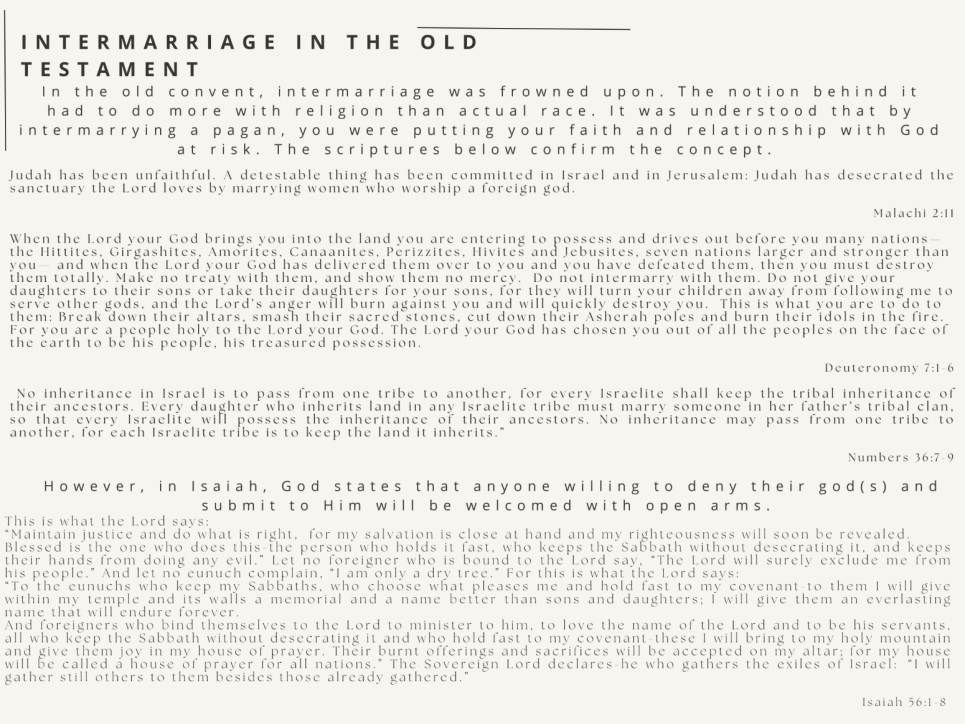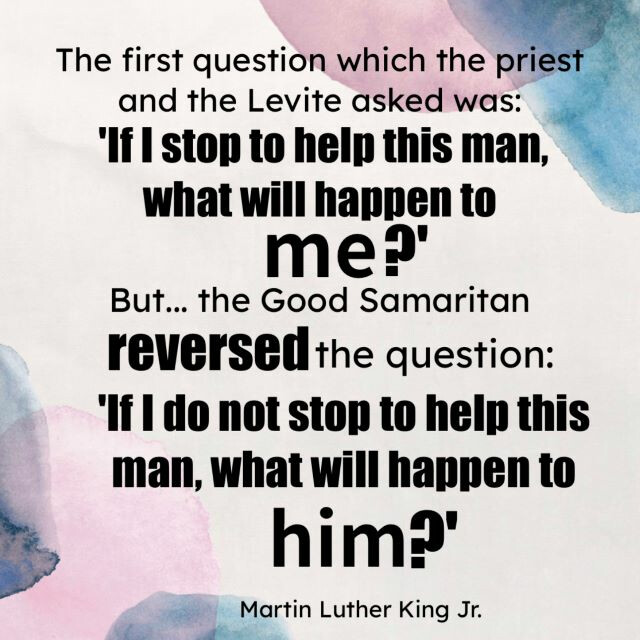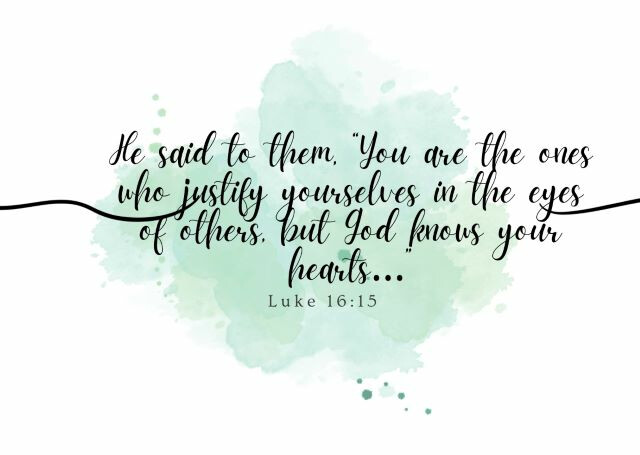Bible Verses for all that the Spring Season Encompasses
As the warmth sets out to defrost the earth, the birds begin to grace us with their merry songs, the fauna brings about new life, and the vegetation begins to sprout. Restlessness dissolves into a newfound sense of energy as humankind starts to venture outside to delight in the rebirth that springtime initiates. Cheerful laughter fills the air as families gather at parks, and the sidewalks begin to fill with brightly colored masterpieces; chalky residue smear tiny fingertips. Bees buzz diligently about, and soft breezes whirl and carry off fallen seeds of trees; gently transporting them to their new homes where they will settle and flourish. Brilliant colors paint the hillside as fragrant flowers bud and blossom, while the nooks and crevices at home are spritzed and wiped down; the dust bunnies cleared away. Old clothes get sorted and donated to those who have more use for them, and winter attire is neatly packed away. The serene murmur of rivers is heard as they reawaken from their icy confinement. Twigs and grass are collected as hopeful avians build their nests for their eggs. Spring marks the end of hibernation, the beasts wake from their restful slumber, and the heat of the sun fills life with zeal and excitement. Soft giggles echo through the atmosphere while toddlers run and splash through puddles, triumphant applause roars as colorful kites soar across the sky, and iridescent bubbles float freely away as they depart the loop of a plastic wand. Butterflies flitter garden to garden alongside the cherry red ladybugs that casually stroll among the greenery. Rosy cheeks balloon before the exhale of breath is vigorously released, prompting the tiny white seeds of dandelions to dance around the man-made zephyr, while the culprit gleefully makes a wish. Red checkered blankets are laid across freshly trimmed grass as couples leisurely slow down and bask in one another’s company; holding hands and sharing their aspirations with one another, as wispy clouds lazily saunter above.
As Christians, we know spring represents more than the pleasant sound of leaves rustling in the breeze, a feeling far more prominent than the welcomed touch of the sun kissing our skin. Spring signifies a deeper and greater appreciation for new life, transformation, rebirth, renewal, growth, new beginnings, hope, restorations, promises, progress, and cleansing. Spring symbolizes God’s promise of eternal life. It is a reminder of Christ's love and sacrifice. It is the time to rejuvenate our spiritual health. It’s the time to start anew.
That is why we have collected scriptures from the Bible that capture the remarkable beauty and transformation of the season. The verses will encourage the spiritual meaning that embodies springtime.
Bible Verses for Springtime
So will it be with the resurrection of the dead. The body that is sown is perishable, it is raised imperishable; it is sown in dishonor, it is raised in glory; it is sown in weakness, it is raised in power; it is sown a natural body, it is raised a spiritual body. If there is a natural body, there is also a spiritual body. 1 Corinthians 15:42-44

See! The winter is past; the rains are over and gone. Flowers appear on the earth; the season of singing has come, the cooing of doves is heard in our land. The fig tree forms its early fruit; the blossoming vines spread their fragrance. Arise, come, my darling; my beautiful one, come with me. Songs of Songs 2:11-13

Therefore, if anyone is in Christ, the new creation has come: The old has gone, the new is here! 2 Corinthians 5:17
Do not conform to the pattern of this world, but be transformed by the renewing of your mind. Then you will be able to test and approve what God’s will is—his good, pleasing and perfect will. Romans 12:2

For I will pour water on the thirsty land, and streams on the dry ground; I will pour out my Spirit on your offspring, and my blessing on your descendants. They will spring up like grass in a meadow, like poplar trees by flowing streams. Isaiah 44:3-4

He saved us, not because of righteous things we had done, but because of his mercy. He saved us through the washing of rebirth and renewal by the Holy Spirit. Titus 3:5
When a king’s face brightens, it means life; his favor is like a rain cloud in spring. Proverbs 16:15

Let my teaching fall like rain and my words descend like dew, like showers on new grass, like abundant rain on tender plants. Deuteronomy 32:2
The desert and the parched land will be glad; the wilderness will rejoice and blossom.
Like the crocus, it will burst into bloom; it will rejoice greatly and shout for joy. The glory of Lebanon will be given to it, the splendor of Carmel and Sharon; they will see the glory of the Lord, the splendor of our God. Strengthen the feeble hands, steady the knees that give way; say to those with fearful hearts, “Be strong, do not fear; your God will come, he will come with vengeance; with divine retribution he will come to save you. Then will the eyes of the blind be opened and the ears of the deaf unstopped. Then will the lame leap like a deer, and the mute tongue shout for joy. Water will gush forth in the wilderness and streams in the desert. The burning sand will become a pool, the thirsty ground bubbling springs. In the haunts where jackals once lay, grass and reeds and papyrus will grow. And a highway will be there; it will be called the Way of Holiness; it will be for those who walk on that Way. The unclean will not journey on it; wicked fools will not go about on it. No lion will be there, nor any ravenous beast; they will not be found there. But only the redeemed will walk there, and those the Lord has rescued will return. They will enter Zion with singing; everlasting joy will crown their heads. Gladness and joy will overtake them, and sorrow and sighing will flee away. Isaiah 35:1-10
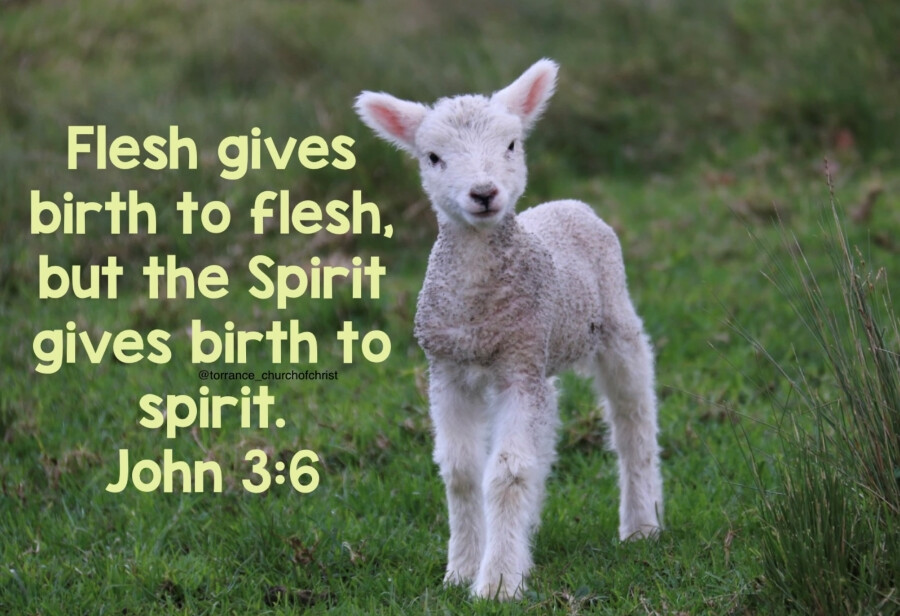
Flesh gives birth to flesh, but the Spirit gives birth to spirit. John 3:6
There is a time for everything, and a season for every activity under the heavens:
a time to be born and a time to die, a time to plant and a time to uproot, a time to kill and a time to heal, a time to tear down and a time to build, a time to weep and a time to laugh, a time to mourn and a time to dance, a time to scatter stones and a time to gather them, a time to embrace and a time to refrain from embracing, a time to search and a time to give up, a time to keep and a time to throw away, a time to tear and a time to mend, a time to be silent and a time to speak, a time to love and a time to hate, a time for war and a time for peace. Ecclesiastes 3:1-8

But those who hope in the Lord will renew their strength. They will soar on wings like eagles; they will run and not grow weary, they will walk and not be faint. Isaiah 40:31
Restore us to yourself, Lord, that we may return; renew our days as of old. Lamentations 5:21

Do not lie to each other, since you have taken off your old self with its practices and have put on the new self, which is being renewed in knowledge in the image of its Creator. Colossians 3:9-10
As the rain and the snow come down from heaven, and do not return to it without watering the earth and making it bud and flourish, so that it yields seed for the sower and bread for the eater, so is my word that goes out from my mouth:
It will not return to me empty, but will accomplish what I desire and achieve the purpose for which I sent it. You will go out in joy and be led forth in peace; the mountains and hills will burst into song before you, and all the trees of the field will clap their hands. Instead of the thornbush will grow the juniper, and instead of briers the myrtle will grow. This will be for the Lord’s renown, for an everlasting sign, that will endure forever. Isaiah 55:10-13

I will sprinkle clean water on you, and you will be clean; I will cleanse you from all your impurities and from all your idols. I will give you a new heart and put a new spirit in you; I will remove from you your heart of stone and give you a heart of flesh. Ezekiel 36:25-26
Praise the Lord, my soul, and forget not all his benefits—who forgives all your sins and heals all your diseases, who redeems your life from the pit and crowns you with love and compassion, who satisfies your desires with good things so that your youth is renewed like the eagle’s. Psalm 103:2-5

For as in Adam all die, so in Christ all will be made alive. 1 Corinthians 15:22
Do not be afraid, you wild animals, for the pastures in the wilderness are becoming green. The trees are bearing their fruit; the fig tree and the vine yield their riches. Be glad, people of Zion, rejoice in the Lord your God, for he has given you the autumn rains because he is faithful. He sends you abundant showers, both autumn and spring rains, as before. The threshing floors will be filled with grain; the vats will overflow with new wine and oil. Joel 2:22-24

We were therefore buried with him through baptism into death in order that, just as Christ was raised from the dead through the glory of the Father, we too may live a new life. For if we have been united with him in a death like his, we will certainly also be united with him in a resurrection like his. For we know that our old self was crucified with him so that the body ruled by sin might be done away with, that we should no longer be slaves to sin— because anyone who has died has been set free from sin. Romans 6:4-7
Be patient, then, brothers and sisters, until the Lord’s coming. See how the farmer waits for the land to yield its valuable crop, patiently waiting for the autumn and spring rains. James 5:7
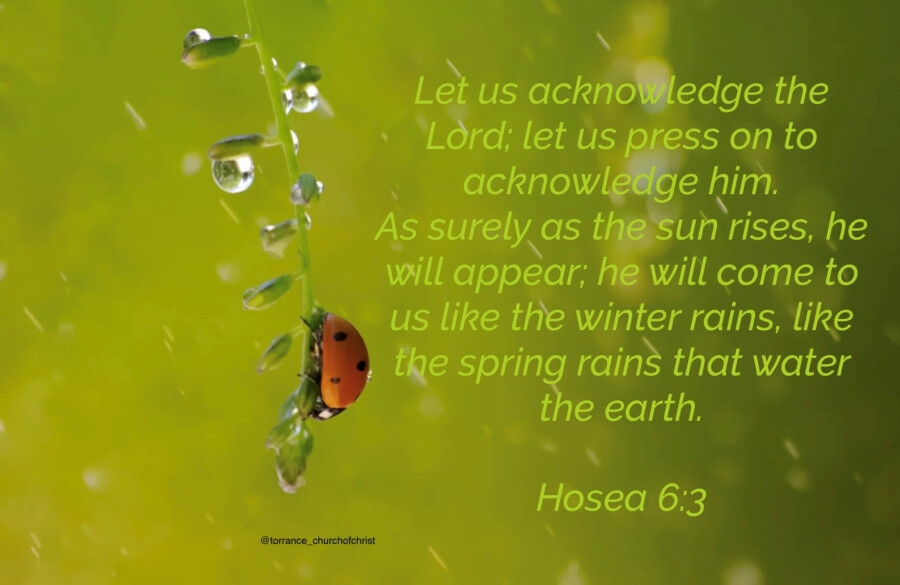
Let us acknowledge the Lord; let us press on to acknowledge him. As surely as the sun rises, he will appear; he will come to us like the winter rains, like the spring rains that water the earth. Hosea 6:3
Yet you sweep people away in the sleep of death— they are like the new grass of the morning. Psalm 90:5

You were taught, with regard to your former way of life, to put off your old self, which is being corrupted by its deceitful desires; to be made new in the attitude of your minds; and to put on the new self, created to be like God in true righteousness and holiness. Ephesians 4:22-24

Create in me a pure heart, O God, and renew a steadfast spirit within me. Do not cast me from your presence or take your Holy Spirit from me. Restore to me the joy of your salvation and grant me a willing spirit, to sustain me. Psalm 51:10-12
A voice says, “Cry out.” And I said, “What shall I cry?” “All people are like grass, and all their faithfulness is like the flowers of the field. The grass withers and the flowers fall, because the breath of the Lord blows on them. Surely the people are grass. The grass withers and the flowers fall, but the word of our God endures forever.” Isaiah 40:6-8

Jesus replied, “Very truly I tell you, no one can see the kingdom of God unless they are born again.” John 3:3
The law of the Lord is perfect, refreshing the soul. The statutes of the Lord are trustworthy, making wise the simple. Psalm 19:7

For you have been born again, not of perishable seed, but of imperishable, through the living and enduring word of God. 1 Peter 1:23
That person is like a tree planted by streams of water, which yields its fruit in season and whose leaf does not wither— whatever they do prospers. Psalm 1:3

Ask the Lord for rain in the springtime; it is the Lord who sends the thunderstorms. He gives showers of rain to all people, and plants of the field to everyone. Zechariah 10:1

Because of the Lord’s great love we are not consumed, or his compassions never fail. They are new every morning; great is your faithfulness. Lamentations 3:22-23
For as the soil makes the sprout come up and a garden causes seeds to grow, so the Sovereign Lord will make righteousness and praise spring up before all nations. Isaiah 61:11
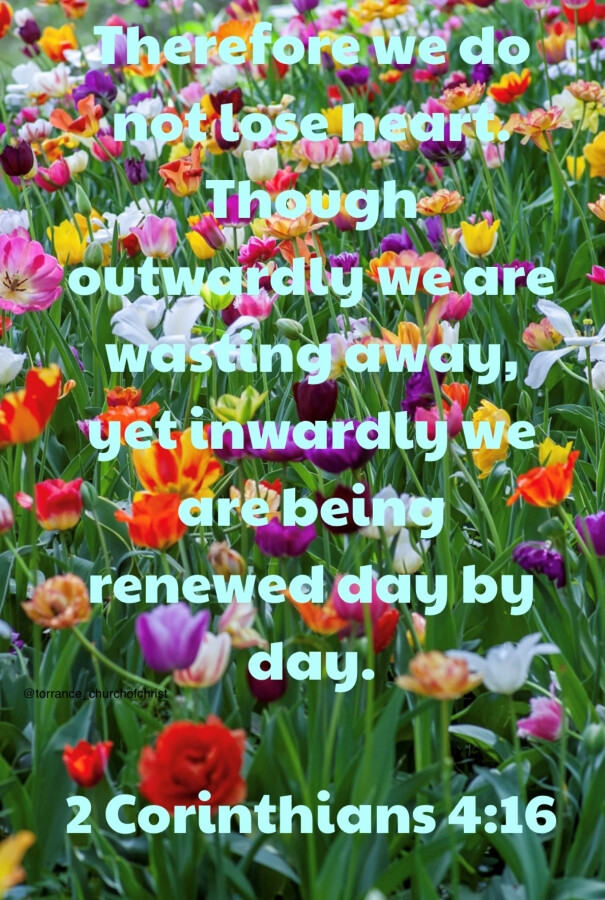
Therefore we do not lose heart. Though outwardly we are wasting away, yet inwardly we are being renewed day by day. 2 Corinthians 4:16
When you send your Spirit, they are created, and you renew the face of the ground. Psalm 104:30

So if you faithfully obey the commands I am giving you today—to love the Lord your God and to serve him with all your heart and with all your soul—then I will send rain on your land in its season, both autumn and spring rains, so that you may gather in your grain, new wine and olive oil. Deuteronomy 11:13-14
All Things Considered

He who was seated on the throne said, “I am making everything new!” Then he said, “Write this down, for these words are trustworthy and true.” Revelation 21:5
Christ assures us that He will make everything new. This includes those eager and willing to listen and live by His teachings. It is through Him that we will be restored!
-Torrance Church of Christ




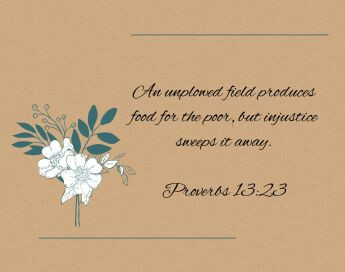






 Let’s Unpack
Let’s Unpack